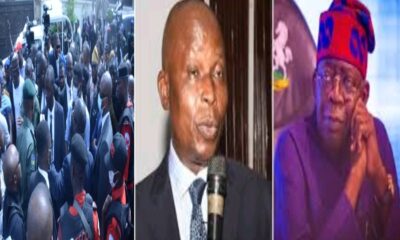Global Issues
Six Implications of Brexit, Through the Eyes of a Foreign Resident -By Zainab Usman


Zainab Usman
Against all odds, Britain has voted to leave the European Union, astounding observers, policymakers and even the Leave campaigners. 52 percent of voters voted Leave in defiance of credible warnings of dire economic and geopolitical consequences by experts, economists, international organisations, Britain’s allies, U.S. President Barack Obama and pretty much everyone else. Brexit’s victory was a solid four-point lead over the Remain camp’s 48 percent of the vote. Few forecasters, not even the bookies, saw this coming. Over the next hours, days and weeks, the political and economic enormity of this decision will become more apparent to voters and the world at large.
In my six years of living in England, I have witnessed, with incredulity, the changing political culture in the public sphere which preceded and actually crystallised in this historic referendum. Based on these observations, these are the six implications I can see so far (they are by no means exhaustive):
1. An Anti-Establishment Vote by the Marginalised
The Brexit vote is a political backlash against the ‘establishment’, a catch all phrase for politicians, the media, economic institutions, or those with power. The way I see it, and as many analysts and economists have pointed out, this backlash is a political response to the progressive decline in material wellbeing of the middle class, from Thatcher’s reforms in the 1980s and exacerbated by the 2008 financial crisis, a phenomenon neither seriously acknowledged nor addressed. There are so many grievances by working class and blue collar workers, displaced by the steady loss of competitiveness and deindustrialisation of British manufacturing and the aftermath of the financial crisis. Since 2010, the austerity policies of massive cuts in social welfare and gross underinvestment in public services have pushed many in the working class to economic precarity while the financial institutions in the thick of it all were bailed out by the government with tax-payer funds, and rewarded their top executives with hefty bonuses. The average worker saw a eight percent decline in real wages between 2008 and 2013, according to the National Institute of Economic and Social Research (NIESR). Not to exaggerate, but there is a rise in food banks, an indication of rising food poverty in the world’s fifth largest economy.
Amidst all this, what I’ve always found astonishing is the dearth of critical commentary to articulate the grievances of this disadvantaged demographic in the public sphere, especially in the British media. It is generally pro-establishment, including the so-called left-leaning press. Watching and following political commentaries, I’m often astonished at the sameness of views of most commentators, while critical voices are often savaged by the press, and thereby marginalised. Look no further than how both UK Independence Party (UKIP)’s Nigel Farage and Labour’s Jeremy Corbyn on the far-right and far-left respectively, both propelled to power by vibrant grassroots movements, are usually savaged daily in the press, and portrayed as loony, sloppy, and unsophisticated. In the run up to the referendum, there were few insights into the lives of everyday people who would be making this momentous decision, with the exception of this short documentary by The Guardian, released a day before the vote.
The referendum thus presented an opportunity for these marginalised, maligned and angry voices to speak, and this was their decision. For many, it was a vote against a ‘technocracy’ in Brussels, in Westminster, which formulated economic policies that they felt, rightly or wrongly, did not favour them but did an already advantaged ‘elite’. With the Brexit vote, I hope more politicians, journalists, and more of the commentariat will now actually listen to what the people are saying and are feeling.
2. Britain: Beset by Class, Economic and Regional Disparities
Brexit and the lively debates which preceded it have unearthed and reinforced deep divisions in the U.K. The deeply ingrained and institutionalised class divisions across all spheres of British life in business, politics, the media, academia and the arts, never cease to amaze me. Even top chefs and top actors are Oxbridge educated or Eton alumni, as these reports by the Social Mobility and Child Welfare Commission in 2014, and by the Sutton Trust in 2016 revealed. Of course private education is inherently not bad, but it is the limited scope for social mobility and the hegemony of ideas that this represents that I find discomforting.
Privately Educated
Numerous reports have been published since 2008 about rising economic inequalities, graduate unemployment, housing crises, a strain on public services etc., leaving many behind, and reinforcing the privilege of elite Oxbridge, Public School (i.e. private school) and personal networks who sit atop all spheres. I’m neither ideological nor a huge fan of the Left, but it is the limited scope for social mobility across all strata in British public life, especially in the media and the arts, that I worry about. Most of the big newspapers (the Times, Daily Mail, Telegraph, Mirror, the Financial Times, etc) are right of centre or very right wing (but not quite far right).
No wonder, there was a surge of support for the far-right and far-left movements during the general elections in 2015, and afterwards in Nigel Farage’s UKIP, Nicola Sturgeon’s Scottish National Party (SNP) and Jeremy Corbyn’s Labour Party, most of which were actually grassroots movements. Regionally, areas with higher unemployment, closed industries, preferred to Leave, including surprise, surprise, the highly diverse Birmingham. While more prosperous and cosmopolitan areas such as London and Manchester preferred to Remain in the EU. Scotland, which is under the political control of the left-wing SNP overwhelmingly voted to Remain as illustrated below.
3. ‘Project Hate’s’ Victory Will Embolden Other Far-Right Movements
Now this is where it gets really worrying. Any observer of international politics is familiar with the ascendancy of far-right movements across Europe and in the United States. Think of Marine Le Pen’s Front National in France, Jobbik in Hungary, Golden Dawn in Greece, Geert Wilders’ Dutch Party for Freedom in The Netherlands, the Alternative for Democracy (AfD) in Germany, a narrow defeat of the Freedom Party in Austria in May 2016, the Tea Party movement of the Republicans in the US and the big man himself, Donald Trump, to mention a few (see this report by the New York Times). The one common denominator of these popular movements is their nativism, rabid anti-immigration and xenophobic stance, islamophobia and an unabashed dislike for diversity which they believe is usurping a golden age of white supremacy. These extreme views are these movements’ deliberately simplistic responses to existing and legitimate economic grievances of deindustrialisation, rising unemployment, stagnation and even decline in wages.
In my six years in Britain, I have watched this xenophobia and outright racism move from the fringes of public commentary right into the mainstream in the run up to the referendum. Having lost the economic argument about the merits of Brexit to the dire warnings of economic recession by the Bank of England, the International Monetary Fund (IMF), the OECD, the World Trade Organisation (WTO), Barack Obama and anyone you can think of, the Leave camp went all out, strategically focusing all its energies on anti-immigration. With hideously xenophobic posters, the Leave campaign was dubbed ‘Project Hate’, and boy, did they drum it! A zealot of the far right British First movement murdered an MP, Jo Cox, a week before the polls.
Therefore, the victory of emotion over reason which Brexit represents could embolden these other far right political movements across the world, which have in most instances only been narrowly defeated. Donald Trump is the immediate one that comes to mind, having defied the odds to win the Republican primaries, invoking a raw anti-establishment, nativist, and nationalistic rhetoric. Worse still, we’re witnessing the normalisation and mainstreaming of bigotry against powerless minorities in these societies. We should all be worried.
Nigeria narrowly avoided disintegration during the 1967-1970 Civil War… Since 2015, there has been a resurgence in secessionist sentiment in parts of the old Biafra enclave…and by other groups in parts of the oil-producing Niger Delta… there are not a few separatist strains in Africa’s most populous country, and depending on how the Brexit fallout is managed, they could be emboldened further with profound geopolitical, economic and security implications for West Africa.
4. Scapegoating Foreigners and Minorities
Since Brexit marks a triumph of emotion, over sound economic reasoning, there will likely be dire economic consequences in the short, medium and long term. Many economists and business leaders have predicted a loss of value of the British pound, negative growth rates, a recession for at least two years, deterioration of already declining British economic competitiveness as a global financial centre, the relocation of firms’ branches and even headquarters abroad, deterioration of academic competitiveness etc.
Of course, these are just forecasts, which could go either way. If these materialise, there will be more economic hardship in the short term until massive public investment and a viable investment and industrial strategy is put in place to address these issues holistically and the massive skills gap in the UK, as many of these LSE and other top economists have recommended. Before then, the blame game will continue, most likely against immigrants, foreigners, Muslims and other minorities accused of stealing jobs and undercutting wages. These are not my conclusions but I largely concur with other reports, studies and even documentaries which have pointed to this.
5. Implications for Africa and the Commonwealth
Of course one has to wonder what impact Brexit will have on former colonies in Africa and Asia. The analysts at Brookings Institution wrote a think piece on likely changes in the nature of UK and EU aid flows to Africa, and also likely changes to trade pacts. However, I’ve been mulling the political and security implications since the Scottish Independence Referendum in 2014: If Britain, as premier coloniser of the 18th and 19th centuries, the creator of many modern states in the developing world, cannot get its act together, why should its artificial creations remain intact? The Indian sub-continent, the ‘jewel in the crown’ of the British Empire was partitioned in two countries, India and Pakistan in 1947, and Bangladesh seceded from Pakistan in 1971. In 2011, South Sudan seceded from The Republic of Sudan, another British colonial possession. The modern Middle East, a creation of the British and the French Sykes-Picot Agreement which dismembered the Ottoman Empire during the First World War, is in upheaval and could have some borders redrawn, especially Iraq, Syria and Yemen.
Which leaves us with the elephant in the room, Nigeria and her numerous separatist elements. With full support of the British, Nigeria narrowly avoided disintegration during the 1967-1970 Civil War with the Biafra enclave in the Eastern region. To that effect, one has to wonder what Brexit and its possible spillover effects will have. This will be more salient if Scotland presses for another independence referendum and Northern Ireland’s nationalist succeed in their calls for reuniting with the Republic of Ireland, thereby disintegrating the United Kingdom as we know it. Since 2015, there has been a resurgence in secessionist sentiment in parts of the old Biafra enclave, in Nigeria’s South-East, championed by a resurgent Indigenous People of Biafra (IPOB) and its followers, and by other groups in parts of the oil-producing Niger Delta. Less publically known is that other southern power blocs, especially in the highly organised and homogenous South-West could also strategically press for secession if it starts to seem feasible.
The point is, there are not a few separatist strains in Africa’s most populous country, and depending on how the Brexit fallout is managed, they could be emboldened further with profound geopolitical, economic and security implications for West Africa.
6. Whither the International Liberal Order?
This is admittedly a big question, which I have no answer to, but it must be considered. The international liberal economic order as we know it today, although largely modelled according to the aspirations and vision of the USA after the Second World War, was pioneered by Britain. In the heady days of Pax Britannica, pre-industrial societies of all hues from Southern Africa to the East in China were forcefully incorporated by the British Empire into the global economy through slavery, trade wars, military conquest and political subjugation. Two centuries, two world wars, three global financial crises and one Chinese ascendancy later, Britain seems to be withdrawing from this international order it pioneered into a nativist cocoon.
Although this liberal economic order is fraught with imperfections, my modest readings of recent history make me more predisposed to stable reform than an outright collapse and radical usurpation. Look no further than the Arab Spring. This is especially crucial. If Brexit is followed by a severe weakening or collapse of the EU (Marine Le Pen in France and Geert Wilders in Denmark have already called for referenda in their various countries, many are unhappy with Merkel and Greece is in crisis), rising trade protectionism, the victory of Donald Trump and rising U.S. Protectionism and isolationism, these developments could would weaken prospects of international cooperation, vital to addressing pressing challenges of terrorism, climate change, migration, unfair trade practices, tax evasion etc. At worst, they would create a vacuum, which will be filled by… Who knows? Look at how a political vacuum in Iraq incubated the so-called Islamic State.
We are in for interesting and turbulent times.
Zainab Usman is a doctoral candidate in international development at the University of Oxford. Her research assesses the oil economy, economic reform and political institutions in Nigeria since the transition to democracy in 1999. She tweets at @msszeeusman.



















